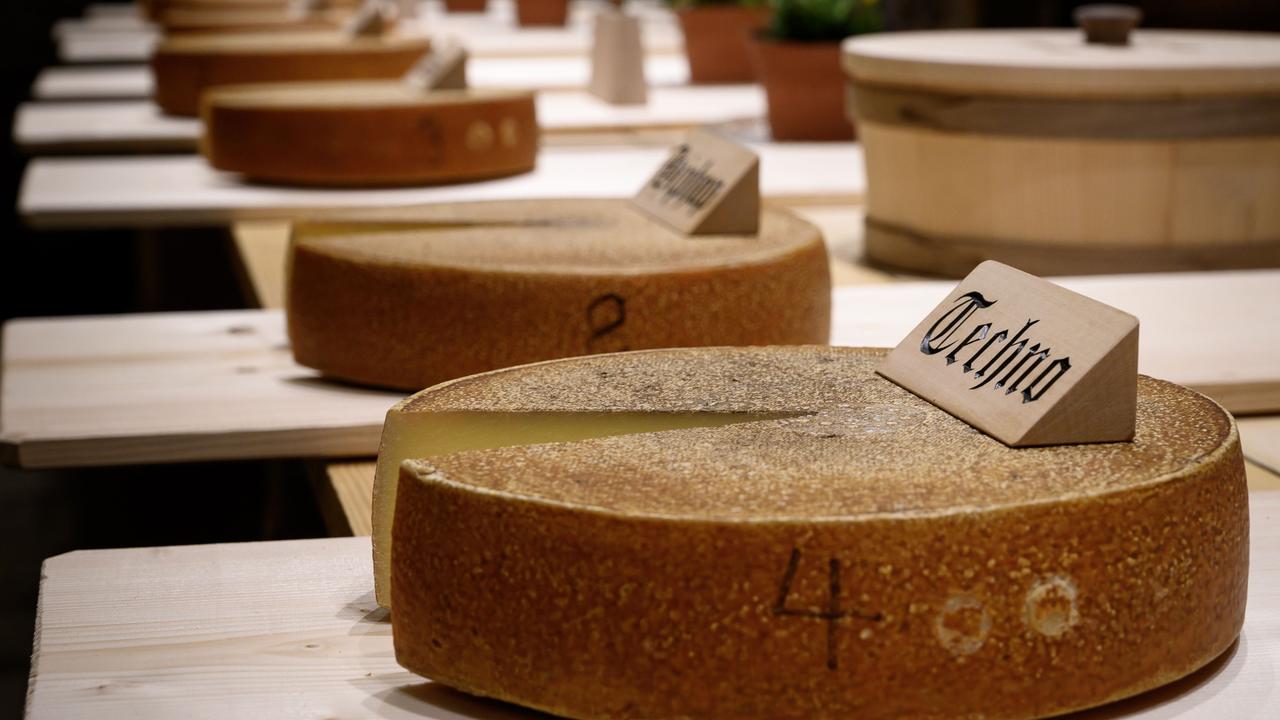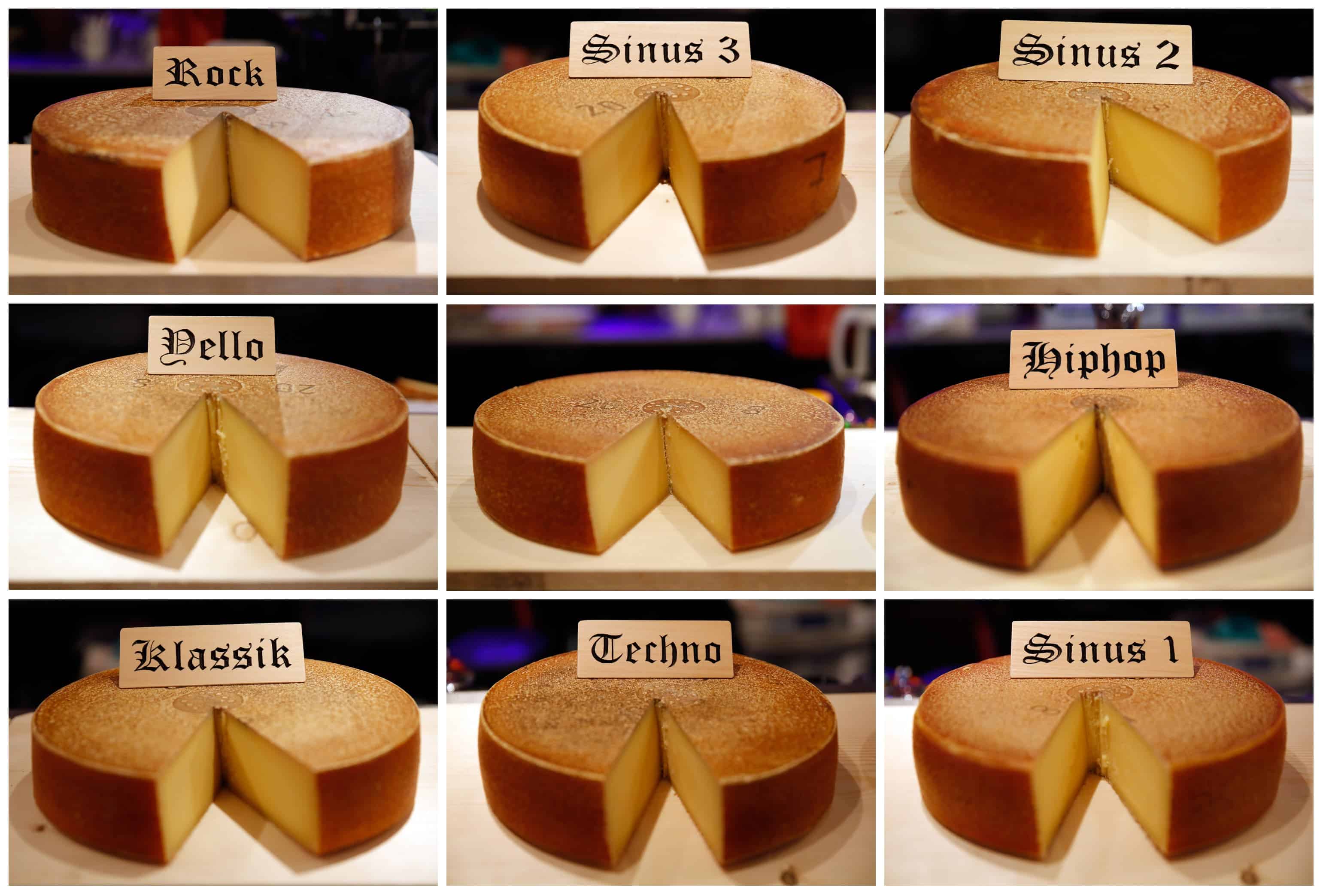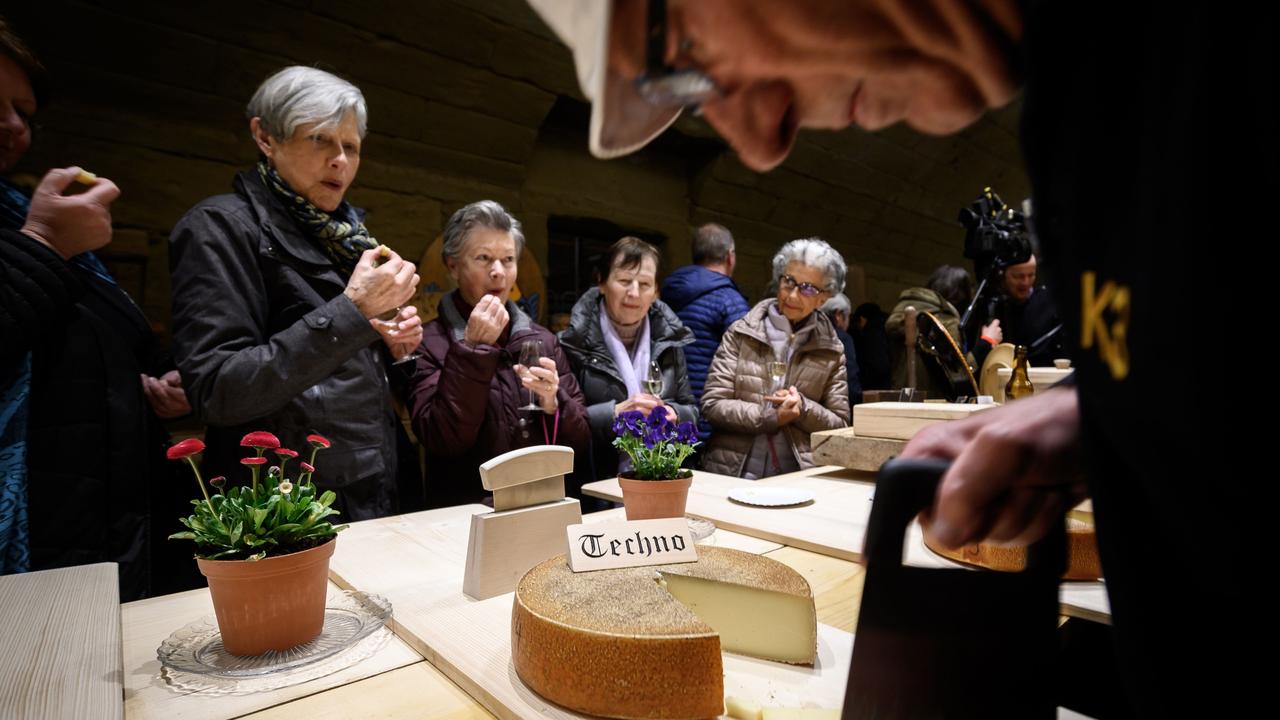Can Music Make Cheese Taste Better? Scientists Play Music To Cheese And Results In Distinct Flavor
In an unconventional experiment, scientists play music to cheese to explore how different genres affect its aging process and flavor, revealing intriguing preliminary results about the sensory impact of sound on cheese.
Author:Xander OddityReviewer:Dr. Felix ChaosphereJan 10, 202412.6K Shares182.9K Views

Can musicmake cheese taste better? Well, this question may not even pop into your head, but did you know that experts have thought of it and scientists play music to cheeseto experiment and check the results?
Swiss cheesemaker Beat Wampfler, in collaboration with researchers from the Bern University of Arts, has embarked on an unprecedented experiment to explore the influence of music on cheese aging. This unique study, conducted in Wampfler's cheese cellar, involved exposing nine 22-pound wheels of Emmental cheese to different genres of music over a six-month period.
The Role Of Sonochemistry In The Experiment
An intriguing aspect of the research was its exploration of sonochemistry, a field that examines the influence of sound waves on solid bodies. Michael Harenberg, director of the music program at Bern University of the Arts, initially expressed skepticism about the project’s feasibility. "Then we discovered there is a field called sonochemistry that looks at the influences of sound waves, the effect of sound on solid bodies,” Harenberg said, highlighting the scientific foundation underpinning the experiment.
Can Music Make Cheese Taste Better?
The experiment conducted by Swiss cheesemaker Beat Wampfler and researchers from the Bern University of Arts sought to answer the question: Can music make cheese taste better? Based on their findings, there is an indication that music might indeed have an impact on the taste of cheese.
Each cheese wheel was placed in a separate wooden crate and subjected to a continuous 24-hour loop of a single music genre, delivered directly into the cheese via a mini-transducer.

Specific Music Genres And Their Effects On Cheese
In the experiment, various music genreswere used to explore their impact on cheese aging. The "classical" cheese was serenaded with Mozart’s "The Magic Flute," while the "rock" cheese listened to Led Zeppelin’s "Stairway to Heaven." An "ambient" cheese was played Yello’s "Monolith," and the "hip-hop" cheese was exposed to A Tribe Called Quest’s "Jazz (We’ve Got)." Additionally, the "techno fromage" enjoyed Vril’s "UV." Alongside these, a control cheese aged in silence, and three other wheels were subjected to simple high-, medium-, and low-frequency tones.
This varied musical exposure led the ZHAW Food Perception Research Group to conclude that the cheeses exposed to music had a milder flavor overall compared to the non-musical cheese. Notably, the hip-hop cheese developed a stronger aroma and a more pronounced flavor than the others, which was further corroborated by a jury of culinary experts during two rounds of blind taste tests.
Diverse Reactions From Experts
Chef and jury member Benjamin Luzuy commented on the diversity in taste, particularly favoring the Mozart-influenced cheese.
“My favorite cheese was that of Mozart, I like Mozart but it’s not necessarily what I listen to… maybe a sweet little classical music does good to the cheese,” Luzuy told Agence-France Presse.
He also noted, “The differences were very clear, in terms of texture, taste, the appearance, there was really something very different.”
Scientific Skepticism And The Need For Further Research
Despite these intriguing initial findings, the research team maintains a cautious stance. “In general, it can be confirmed that the discernible sensory differences detected during the screening process were minimal. The conclusion that these differences did indeed confirm the hypothesis, namely that they can clearly be traced back to the influence of music, is conceivable, but not compelling,” the researchers stated.
They emphasized the necessity of more comprehensive testing to ascertain a definitive link between music exposure and sensory differences in cheese, stating, "More extensive testing is required in order to determine whether there is a link between exposing cheese wheels to music as they mature and discernible sensory differences."
Future Directions And Wampfler's Vision
Wampfler, expressing hope early in the experiment for the success of the hip-hop cheese, plans to continue this line of research. “I hope that hip-hop cheese will be the best,” indicating a future focus on the effects of different hip-hop sub-genres on cheese aging.
Implications Of The Study
This innovative study bridges the gap between the culinary arts and science, suggesting that the aging process of cheese might be influenced by external factors like sound waves.
The results, although preliminary, open up new possibilities in the fields of food science and gastronomy. The experiment not only sheds light on the complex relationship between sound and biological processes but also introduces a novel approach to cheese production.
The Broader Context And Future Research
The study, while capturing the public imagination, remains subject to scientific scrutiny. The effect of music on the aging process of cheese is a concept that requires further exploration to be fully understood and accepted within the scientific community. The research team acknowledges this, calling for more extensive studies to validate their findings.
The experiment conducted by Wampfler and the Bern University of Arts presents an intriguing intersection of music and gastronomy. While the results have sparked interest and debate, they represent only the beginning of a deeper exploration into the potential sensory impact of music on cheese maturation. As researchers continue to delve into this phenomenon, the possibilities for innovative approaches in cheese-making remain vast and largely untapped.
Scientists Play Music To Cheese - FAQs
What Was The Purpose Of The Experiment Where Scientists Play Music To Cheese?
The experiment aimed to investigate if music could influence the maturation process and flavor profile of cheese. It explored the potential effects of sound waves, specifically from various music genres, on the development of cheese's taste and aroma.
How Did The Scientists Conduct The Cheese And Music Experiment?
In this unique study, nine wheels of Emmental cheese were exposed to different genres of music over six months. Each cheese was placed in a separate wooden crate with a mini-transducer, which played a continuous 24-hour loop of a single music genre directly into the cheese.
What Types Of Music Were Played To The Cheese?
The experiment featured a diverse range of music genres. These included classical music like Mozart’s “The Magic Flute,” rock music such as Led Zeppelin’s “Stairway to Heaven,” and hip-hop tracks like A Tribe Called Quest’s “Jazz (We’ve Got).” One wheel of cheese was also kept in silence as a control.
What Were The Results Of The Experiment?
The cheeses exposed to music generally had a milder flavor compared to the control. Notably, the cheese exposed to hip-hop music exhibited a stronger aroma and flavor. These findings were based on both scientific analysis and blind taste tests by culinary experts.
Who Conducted The Experiment?
The experiment was a collaborative effort between Swiss cheesemaker Beat Wampfler and researchers from the Bern University of Arts. Their combined expertise in cheesemaking and sound arts provided a unique approach to this study.
What Is Sonochemistry And How Does It Relate To The Experiment?
Sonochemistry is the study of the effects of sound waves, particularly ultrasonic and high-frequency sound, on chemical systems. This experiment ventured into sonochemistry by investigating how music, as a form of sound wave, could impact the chemical processes in cheese aging.
Were There Any Skeptical Views About The Experiment?
Yes, there were initial skepticisms, particularly regarding the scientific basis of the experiment. However, the involvement of sonochemistry provided a theoretical foundation, and the careful design of the experiment helped address some of these skeptical views.
What Does This Experiment Suggest About The Relationship Between Sound And Food?
The experiment suggests that sound waves, particularly music, might have an impact on the maturation process of food, like cheese. It opens up possibilities for further research on how sonic environments can influence the flavor and texture of food products.
How Has The Culinary World Reacted To This Experiment?
The culinary world has shown keen interest in this experiment, as it suggests new methods of food preparation and flavor enhancement. Chefs and food enthusiasts are intrigued by the potential of using sound to develop unique flavor profiles in food.
What Are The Future Implications Of This Study?
The study opens up new research avenues in food science and gastronomy. Future implications include further experiments to solidify the findings, exploring the effects of different sound frequencies and genres on other types of cheese and food products, and possibly developing new culinary techniques based on sound exposure.
Conclusion
In conclusion, the innovative experiment where scientists play music to cheese represents a fascinating intersection of culinary arts, science, and music. This unique study has not only piqued the interest of food enthusiasts and scientists alike but has also opened new avenues in understanding the complex processes involved in cheese aging.
While the results are preliminary and call for further research, the notion that sound waves could influence the maturation and flavor profile of cheese adds an intriguing layer to the art of cheesemaking. As we await more comprehensive studies, the experiment remains a testament to the creativity and curiosity inherent in scientific inquiry, showcasing a novel approach where scientists play music to cheese to explore uncharted territories in gastronomy.
Jump to
The Role Of Sonochemistry In The Experiment
Can Music Make Cheese Taste Better?
Specific Music Genres And Their Effects On Cheese
Diverse Reactions From Experts
Scientific Skepticism And The Need For Further Research
Future Directions And Wampfler's Vision
Implications Of The Study
The Broader Context And Future Research
Scientists Play Music To Cheese - FAQs
Conclusion

Xander Oddity
Author
Xander Oddity, an eccentric and intrepid news reporter, is a master of unearthing the strange and bizarre. With an insatiable curiosity for the unconventional, Xander ventures into the depths of the unknown, fearlessly pursuing stories that defy conventional explanation. Armed with a vast reservoir of knowledge and experience in the realm of conspiracies, Xander is a seasoned investigator of the extraordinary.
Throughout his illustrious career, Xander has built a reputation for delving into the shadows of secrecy and unraveling the enigmatic. With an unyielding determination and an unwavering belief in the power of the bizarre, Xander strives to shed light on the unexplained and challenge the boundaries of conventional wisdom. In his pursuit of the truth, Xander continues to inspire others to question the world around them and embrace the unexpected.

Dr. Felix Chaosphere
Reviewer
Dr. Felix Chaosphere, a renowned and eccentric psychiatrist, is a master of unraveling the complexities of the human mind. With his wild and untamed hair, he embodies the essence of a brilliant but unconventional thinker. As a sexologist, he fearlessly delves into the depths of human desire and intimacy, unearthing hidden truths and challenging societal norms.
Beyond his professional expertise, Dr. Chaosphere is also a celebrated author, renowned for his provocative and thought-provoking literary works. His written words mirror the enigmatic nature of his persona, inviting readers to explore the labyrinthine corridors of the human psyche.
With his indomitable spirit and insatiable curiosity, Dr. Chaosphere continues to push boundaries, challenging society's preconceived notions and inspiring others to embrace their own inner tumult.
Latest Articles
Popular Articles
